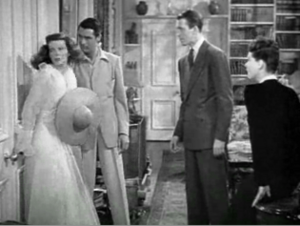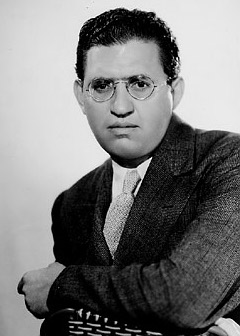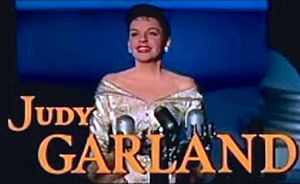George Cukor facts for kids
Quick facts for kids
George Cukor
|
|
|---|---|
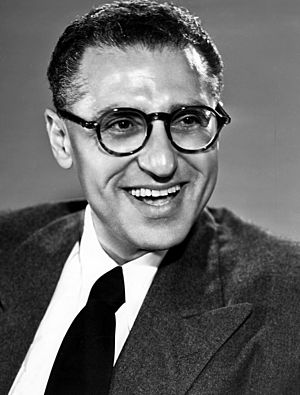
Cukor in 1946
|
|
| Born |
George Dewey Cukor
July 7, 1899 New York City, U.S.
|
| Died | January 24, 1983 (aged 83) Los Angeles, California, U.S.
|
| Resting place | Forest Lawn Memorial Park (Glendale) |
| Occupation |
|
| Years active | 1930–1981 |
| Awards | Academy Award for Best Director 1965 My Fair Lady Golden Globe Award for Best Director 1965 My Fair Lady |
George Dewey Cukor (born July 7, 1899 – died January 24, 1983) was an American film director and film producer. He was famous for directing comedies and movies based on books. His career took off at RKO where he directed major films like What Price Hollywood? (1932) and Little Women (1933).
Later, he moved to Metro-Goldwyn-Mayer (MGM) and directed Dinner at Eight (1933) and David Copperfield (1935). He also directed Romeo and Juliet (1936) and Camille (1936). He was replaced as a director for Gone with the Wind (1939). However, he went on to direct many other successful movies. These include The Philadelphia Story (1940), Gaslight (1944), and Adam's Rib (1949). He also directed Born Yesterday (1950) and A Star Is Born (1954). George Cukor won an Academy Award for Best Director for My Fair Lady (1964). He continued making films until the 1980s.
Contents
Early Life and Interest in Theater
George Cukor was born in New York City on July 7, 1899. His parents were immigrants from Hungary. His middle name, Dewey, was chosen to honor a hero from the Spanish–American War.
As a child, George loved performing. He acted in plays and took dance lessons. When he was seven, he even performed with David O. Selznick, who would later become a good friend and mentor. As a teenager, Cukor often visited the New York Hippodrome, a famous theater. He loved the theater so much that he sometimes skipped school to watch afternoon shows. During his last year of high school, he worked at the Metropolitan Opera. He earned a small amount of money for each appearance.
After graduating in 1917, Cukor was expected to become a lawyer, like his father. He briefly attended the City College of New York. In October 1918, he joined the Students Army Training Corps. However, his military service was short. Germany surrendered in November, and Cukor's duty ended after only two months. He then left college.
Starting a Career in Film
From Stage to Screen
George Cukor first worked as an assistant stage manager for a touring play. In 1920, he became a stage manager for a theater group called the Knickerbocker Players. The next year, he managed the Lyceum Players, a summer theater company. In 1925, he started his own production company, which gave him his first chance to direct plays. He directed a play on Broadway, a famous theater district in New York City.
He then returned to Rochester, New York, where his company became the Cukor-Kondolf Stock Company. Many actors who later worked with Cukor in Hollywood were part of this group. One of them was Bette Davis. Cukor noticed her talent but also that she liked to do things her own way. Davis later claimed she was fired, though Cukor thought it was a small matter. They never worked together again.
For several years, Cukor directed plays in Rochester during the summer and on Broadway in the winter. His direction of The Great Gatsby in 1926 caught the attention of critics. One critic praised his "unusual piece of work." After directing six more Broadway shows, Cukor moved to Hollywood in 1929.
Early Hollywood Work
Hollywood began hiring theater talent for new "talkie" films (movies with sound). Cukor was one of them. In December 1928, Paramount Pictures hired him. His first job was to help actors speak with a Southern accent for a film. In 1930, he helped with screen tests and dialogue for All Quiet on the Western Front. That year, he co-directed three films at Paramount. His first movie as a solo director was Tarnished Lady (1931).
Cukor then worked on One Hour with You (1932). He started directing it, but the original director, Ernst Lubitsch, returned and took over. Cukor eventually left Paramount and joined David O. Selznick at RKO Studios.
Cukor quickly became known for helping actresses give amazing performances. He was sometimes called a "woman's director," a title he didn't like. Even so, he directed more actors who won the Academy Award for Best Actor than any other director. These included James Stewart in The Philadelphia Story (1940), Ronald Colman in A Double Life (1947), and Rex Harrison in My Fair Lady (1964).
One of the actresses Cukor worked with early on was Katharine Hepburn. She made her debut in A Bill of Divorcement (1932). Cukor directed her in several films, some very successful like Little Women (1933) and Holiday (1938). Cukor and Hepburn became close friends.
Working on Famous Films
In 1936, Selznick hired Cukor to direct Gone with the Wind. Cukor spent two years preparing for the film, including supervising screen tests for actresses wanting to play Scarlett O'Hara. Cukor liked Katharine Hepburn for the role, but Selznick was worried about her popularity. Cukor preferred Paulette Goddard among those who auditioned.
While working on Gone with the Wind, Cukor also helped with other movies. He filmed a scene for The Adventures of Tom Sawyer (1938). He also spent a week on the set of The Wizard of Oz (1939). Although he didn't film any scenes, he made important changes. He removed Judy Garland's blonde wig and adjusted her makeup to make her look more natural as Dorothy. He also changed the Scarecrow's makeup and the Wicked Witch's hairstyle and makeup. Cukor also suggested casting Jack Haley as the Tin Man.
Cukor spent many hours coaching Vivien Leigh and Olivia de Havilland for Gone with the Wind. However, Clark Gable did not want to learn a Southern accent. Selznick became unhappy with Cukor's progress and replaced him with Victor Fleming. Even after being replaced, Cukor continued to help Leigh and de Havilland off-set.
Being dismissed from Gone with the Wind allowed Cukor to direct The Women (1939), a film with an all-female cast. He then directed The Philadelphia Story (1940). He also directed Greta Garbo in Two-Faced Woman (1941), which was her last film before she stopped acting.
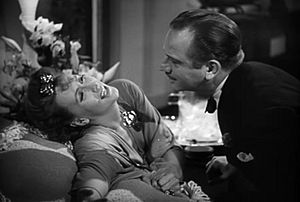
In 1942, Cukor joined the Signal Corps during World War II. He produced training films for the army. He found it difficult to give orders because he was not an officer. Despite his efforts, he remained a private.
The rest of the 1940s brought both hits and misses for Cukor. Two-Faced Woman and Her Cardboard Lover (1942) were not very successful. However, A Woman's Face (1941) with Joan Crawford and Gaslight (1944) with Ingrid Bergman were very popular. During this time, Cukor often worked with screenwriters Garson Kanin and Ruth Gordon. They collaborated on several films, including A Double Life (1947) and Adam's Rib (1949). They also made Born Yesterday (1950), which earned Judy Holliday, another favorite actress of Cukor's, an Academy Award for Best Actress.
Later Career and Achievements
Directing Musicals and Challenges
In 1952, Cukor was asked to direct a musical remake of A Star Is Born (1937) starring Judy Garland. He had turned down the earlier film, but the chance to direct his first film in Technicolor and work with Garland appealed to him. Getting A Star Is Born (1954) made was difficult. Cukor wanted Cary Grant for the male lead, but Grant refused. The director then suggested Humphrey Bogart or Frank Sinatra, but the studio said no. James Mason was eventually cast.
Filming began in October 1953. Cukor had to deal with constant script changes and an unstable Judy Garland, who had many health issues. When the film was almost finished, Cukor left the production. The first version of the film was very long, but audiences loved it. However, studio executives cut the film to make it shorter, which Cukor found "very painful." He was not nominated for an Oscar for this film.
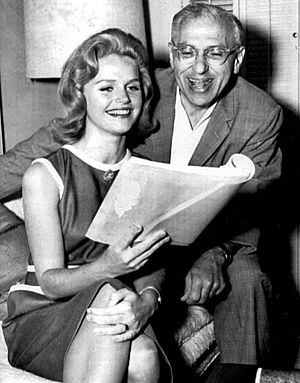
Over the next ten years, Cukor directed several films. Les Girls (1957) won a Golden Globe Award for Best Motion Picture – Musical or Comedy. Wild Is the Wind (1957) earned Oscar nominations for its actors. However, Heller in Pink Tights (1960) was not a success.
Another project during this time was Something's Got to Give, a remake of an older comedy. Cukor liked the lead actress, Marilyn Monroe, but found it hard to work with her because she was often late or absent. The studio eventually fired Monroe, and the film was stopped.
Two years later, Cukor achieved one of his biggest successes with My Fair Lady (1964). He loved working with the lead actress, Audrey Hepburn. Although some critics were not impressed, the film was a huge box-office hit. It won him the Academy Award for Best Director, the Golden Globe Award for Best Director, and the Directors Guild of America Award.
Later Years and Legacy
After My Fair Lady, Cukor directed fewer films. He directed Maggie Smith in Travels with My Aunt (1972). He also directed The Blue Bird (1976), which was the first film made together by the Soviet Union and America. He worked with Katharine Hepburn again for two television movies: Love Among the Ruins (1975) and The Corn Is Green (1979). At 82 years old, Cukor directed his final film, Rich and Famous (1981).
In 1970, he received the Golden Plate Award from the American Academy of Achievement. In 1976, he was given the George Eastman Award for his important contributions to film.
George Cukor passed away from a heart attack on January 24, 1983. He was buried in Forest Lawn Memorial Park (Glendale) in California.
In 1983, a longer version of A Star Is Born was restored to its original length. Cukor had felt that the shorter version "butchered" the story. In 2013, a film festival in New York showed many of his films. In 2019, Cukor's film Gaslight was chosen by the Library of Congress to be saved in the National Film Registry. This means it is considered "culturally, historically, or aesthetically significant."
Filmography
Films Directed by George Cukor
| Year | Title | Studio | Genre | Cast | Notes |
|---|---|---|---|---|---|
| 1930 | Grumpy | Paramount Pictures | Drama | Cyril Maude | Co-directed |
| The Virtuous Sin | Paramount Pictures | Drama | Kay Francis, Walter Huston | Co-directed | |
| The Royal Family of Broadway | Paramount Pictures | Comedy | Fredric March, Ina Claire | Co-directed | |
| 1931 | Tarnished Lady | Paramount Pictures | Drama | Tallulah Bankhead | |
| Girls About Town | Paramount Pictures | Comedy | Kay Francis, Lilyan Tashman | ||
| 1932 | What Price Hollywood? | RKO Radio Pictures | Drama | Constance Bennett, Lowell Sherman | |
| A Bill of Divorcement | RKO Radio Pictures | Drama | Katharine Hepburn, John Barrymore | ||
| Rockabye | RKO Radio Pictures | Drama | Constance Bennett, Joel McCrea | Given credit over original director | |
| 1933 | Our Betters | RKO Radio Pictures | Drama | Constance Bennett | |
| Dinner at Eight | Metro-Goldwyn-Mayer | Drama | John Barrymore, Jean Harlow | ||
| Little Women | RKO Radio Pictures | Drama | Katharine Hepburn, Joan Bennett | ||
| 1935 | David Copperfield | Metro-Goldwyn-Mayer | Drama | Freddie Bartholomew, W. C. Fields | |
| Sylvia Scarlett | RKO Radio Pictures | Comedy | Katharine Hepburn, Cary Grant | ||
| 1936 | Romeo and Juliet | Metro-Goldwyn-Mayer | Romance | Norma Shearer, Leslie Howard | |
| Camille | Metro-Goldwyn-Mayer | Romance | Greta Garbo, Robert Taylor | ||
| 1938 | Holiday | Columbia Pictures | Comedy | Katharine Hepburn, Cary Grant | |
| 1939 | Zaza | Paramount Pictures | Drama | Claudette Colbert, Herbert Marshall | |
| The Women | Metro-Goldwyn-Mayer | Drama | Norma Shearer, Joan Crawford | ||
| 1940 | Susan and God | Metro-Goldwyn-Mayer | Comedy | Joan Crawford, Fredric March | |
| The Philadelphia Story | Metro-Goldwyn-Mayer | Comedy | Katharine Hepburn, Cary Grant, James Stewart | Nominated for six Oscars | |
| 1941 | A Woman's Face | Metro-Goldwyn-Mayer | Drama | Joan Crawford, Melvyn Douglas | |
| Two-Faced Woman | Metro-Goldwyn-Mayer | Comedy | Greta Garbo, Melvyn Douglas | ||
| 1942 | Her Cardboard Lover | Metro-Goldwyn-Mayer | Comedy | Norma Shearer, Robert Taylor | |
| 1943 | Keeper of the Flame | Metro-Goldwyn-Mayer | Drama | Spencer Tracy, Katharine Hepburn | |
| 1944 | Gaslight | Metro-Goldwyn-Mayer | Thriller | Ingrid Bergman, Charles Boyer | Nominated for seven Oscars |
| Winged Victory | 20th Century-Fox | Drama | Lon McCallister, Jeanne Crain | ||
| 1947 | A Double Life | Kanin Productions | Film noir | Ronald Colman, Signe Hasso | |
| 1949 | Edward, My Son | Metro-Goldwyn-Mayer | Drama | Spencer Tracy, Deborah Kerr | |
| Adam's Rib | Metro-Goldwyn-Mayer | Comedy | Spencer Tracy, Katharine Hepburn, Judy Holliday | ||
| 1950 | A Life of Her Own | Metro-Goldwyn-Mayer | Drama | Lana Turner, Ray Milland | |
| Born Yesterday | Columbia Pictures | Comedy | Judy Holliday, Broderick Crawford | Nominated for five Oscars | |
| 1951 | The Model and the Marriage Broker | 20th Century Fox | Comedy | Thelma Ritter, Jeanne Crain | |
| 1952 | The Marrying Kind | Columbia Pictures | Comedy | Judy Holliday, Aldo Ray | |
| Pat and Mike | Metro-Goldwyn-Mayer | Comedy | Spencer Tracy, Katharine Hepburn, Aldo Ray | ||
| 1953 | The Actress | Metro-Goldwyn-Mayer | Comedy | Jean Simmons, Spencer Tracy | |
| 1954 | It Should Happen to You | Columbia Pictures | Comedy | Judy Holliday, Peter Lawford | |
| A Star Is Born | Warner Bros. | Drama | Judy Garland, James Mason | ||
| 1956 | Bhowani Junction | Metro-Goldwyn-Mayer | Drama | Ava Gardner, Stewart Granger | |
| 1957 | Les Girls | Metro-Goldwyn-Mayer | Musical | Gene Kelly, Mitzi Gaynor | |
| Wild Is the Wind | Paramount Pictures | Drama | Anna Magnani, Anthony Quinn | ||
| 1960 | Heller in Pink Tights | Paramount Pictures | Western | Sophia Loren, Anthony Quinn | |
| Song Without End | William Goetz | Drama | Dirk Bogarde, Capucine | Completed film after original director died | |
| 1962 | The Chapman Report | DFZ Productions | Drama | Shelley Winters, Jane Fonda | |
| 1964 | My Fair Lady | Warner Bros. | Musical | Audrey Hepburn, Rex Harrison | Winner of eight Oscars |
| 1969 | Justine | 20th Century Fox | Drama | Michael York, Anouk Aimée | Replaced original director |
| 1972 | Travels with My Aunt | Metro-Goldwyn-Mayer | Comedy | Maggie Smith, Alec McCowen | |
| 1975 | Love Among the Ruins | ABC Circle Films | Drama | Katharine Hepburn, Laurence Olivier | Television film |
| 1976 | The Blue Bird | 20th Century Fox | Drama | Elizabeth Taylor, Jane Fonda | |
| 1979 | The Corn Is Green | Warner Bros. Television | Drama | Katharine Hepburn, Bill Fraser | Television film |
| 1981 | Rich and Famous | Metro-Goldwyn-Mayer | Drama | Jacqueline Bisset, Candice Bergen |
Other Film Contributions
| Year | Title | Studio | Genre | Cast | Notes |
|---|---|---|---|---|---|
| 1932 | One Hour with You | Paramount Pictures | Musical | Maurice Chevalier, Jeanette MacDonald | Directed part of the film |
| The Animal Kingdom | RKO Radio Pictures | Drama | Leslie Howard, Ann Harding | Uncredited | |
| 1934 | Manhattan Melodrama | Metro-Goldwyn-Mayer | Crime | Clark Gable, William Powell | Directed extra scenes |
| 1935 | No More Ladies | Metro-Goldwyn-Mayer | Comedy | Joan Crawford, Robert Montgomery | Completed filming |
| 1938 | I Met My Love Again | Walter Wanger Productions | Romance | Joan Bennett, Henry Fonda | Assisted in directing |
| The Adventures of Tom Sawyer | Selznick International Pictures | Adventure | Tommy Kelly | Shot some retakes | |
| 1939 | Gone With the Wind | Selznick International Pictures | Drama | Vivien Leigh, Clark Gable | Fired early, but some of his scenes remain |
| 1943 | "Resistance and Ohm's Law" | Army Signal Corps | Documentary | Instructional short film | |
| 1944 | I'll Be Seeing You | Selznick International Pictures | Drama | Ginger Rogers, Joseph Cotten | Replaced during production |
| 1947 | Desire Me | Metro-Goldwyn-Mayer | Drama | Greer Garson, Robert Mitchum | Contributed with other directors |
| 1958 | Hot Spell | Paramount Pictures | Drama | Shirley Booth, Anthony Quinn | Uncredited |
| 1962 | Something's Got to Give | 20th Century Fox | Comedy | Marilyn Monroe, Dean Martin | Film was stopped |
Awards and Nominations
| Year | Category | Film | Result | Lost to |
|---|---|---|---|---|
| 1932/33 | Academy Award for Best Director | Little Women | Nominated | Frank Lloyd for Cavalcade |
| 1940 | Academy Award for Best Director | The Philadelphia Story | Nominated | John Ford for The Grapes of Wrath |
| 1947 | Academy Award for Best Director | A Double Life | Nominated | Elia Kazan for Gentleman's Agreement |
| 1950 | Academy Award for Best Director | Born Yesterday | Nominated | Joseph L. Mankiewicz for All About Eve |
| 1964 | Academy Award for Best Director | My Fair Lady | Won | |
| 1950 | Golden Globe Award for Best Director | Born Yesterday | Nominated | Billy Wilder for Sunset Boulevard |
| 1962 | Golden Globe Award for Best Director | The Chapman Report | Nominated | David Lean for Lawrence of Arabia |
| 1964 | Golden Globe Award for Best Director | My Fair Lady | Won |
Images for kids
See also
 In Spanish: George Cukor para niños
In Spanish: George Cukor para niños
 | Kyle Baker |
 | Joseph Yoakum |
 | Laura Wheeler Waring |
 | Henry Ossawa Tanner |



